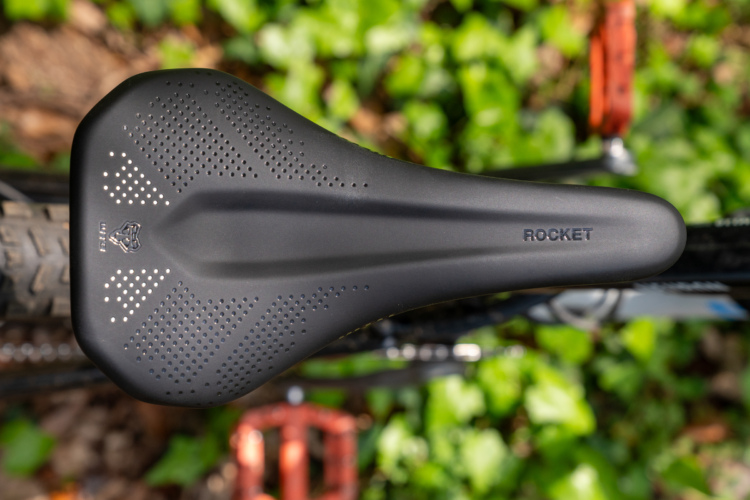Any opinions expressed in this article belong to the author alone, and do not necessarily represent the opinions of Singletracks.com.

Peter Drucker, the famous management consultant is credited with saying, “what gets measured gets managed.” Over the past several years device manufacturers like Fitbit and Garmin have created fitness tracking devices that enable wearers to measure — and ultimately manage — their health. But might some of us unwittingly use fitness data to mismanage our minds and our bodies?
Earlier this year, on Amazon Prime Day, I picked up a Garmin Forerunner 235 for a smoking good price. I had read Gerow’s review of the watch, and tired of carrying my iPhone to record jogs around the neighborhood, I treated myself to a new piece of wearable tech. It’s a fantastic watch and I get a ton of use out of it.
As I began using the watch’s features and accompanying smartphone app, I noticed that some disturbing thoughts started creeping into my head. For starters, the Garmin Connect app allows users to track their body weight over time. I began entering my body weight anytime I stepped on the bathroom scale, and the app helpfully let me know if my weight increased or decreased since the last entry.
After several weight checkins Garmin even built a graph showing my weight over time and I started taking pride in seeing that line go down. What else could I do to make it go even lower: More exercise? Eat less? Exercise and food intake are both good and helpful things to manage for a lot of people — but not if you’re anorexic. According to the Mayo Clinic, the symptoms of anorexia “include trying to maintain a below-normal weight through starvation or too much exercise.”
I’ve been skinny my whole life. As a kid I was teased about it, but at the time it didn’t get to me because I figured that’s just the way I was born. Over the years being thin — and staying thin — became a part of my identity. At some point I guess I decided that if I wasn’t skinny, I wouldn’t be me. I certainly don’t exhibit any of the symptoms of anorexia — I pride myself on the burrito and hot dog eating contests I’ve won and I only exercise 3 times a week if I’m lucky — but my smartphone app now seems capable of pushing me toward developing a serious disorder, encouraging me to count calories and steps like points in a game.
For those whose sense of self worth is tied to fitness or body measurements, owning a fitness tracker can be a bit like an alcoholic taking a sip of gin each night before bed.
“Streaking” is trending among runners and mountain bikers alike, whereby participants attempt to keep up a multi-day streak of a particular physical activity for as long as possible, indefinitely God willing. Smart devices make setting goals and tracking daily activity easy, but is running every day, for example, good for the body? Overuse injuries are a real problem for many athletes, and whether we like it or not, our bodies need rest. Not to mention, it can’t be healthy to go for a ride if you have pneumonia, all in the name of keeping your fitness tracking app happy while your body and spirit are miserable.
My new watch even tracks my sleep each night, giving me a summary of how many hours I slumber. I suppose a lot of folks find this information helpful, but for me, this can be maddening. For starters, I have responsibilities every day that don’t ease up or disappear based on the amount of sleep I had the night before. I could be tempted to tell myself it’s OK to say no to playing with my kids because I didn’t get enough z’s according to my app. Clearly the last thing any of us need is “data” to back up our excuses or to justify negative behaviors.
Beginning in high school I suffered from a very real sense of sleep anxiety. I was always a good student, and I worried that if I didn’t get enough rest each night I wouldn’t be able to perform my best the next day. Serving in the military quickly taught me that yes, I can function and in fact thrive on just a few hours of sleep at night, so personally I’ve been able to move past this. However, having access to sleep data could surely enable sleep anxiety sufferers to become even more stressed and obsessed.
Finally, it should be noted that apps like Strava and Garmin Connect can and do drive some athletes to unhealthy levels of competition, both with themselves and others. In fact, a few have been driven to take risks that ultimately led to their death in pursuit of proving something that most of us would agree is trivial in the grand scheme of things.
Of course, it’s easy to brush this off and say buyer beware, or even to think that none of this will affect us personally. Saying no to fitness trackers is a bit like throwing the baby out with the bathwater since the devices still offer a lot of utility and the potential for positive influence on our lives. It’s also clear that device and software designers are working to minimize the potential harm their products may cause. For example, my Garmin watch flashes a recommended recovery time after each workout, reassuring me that it’s ok — and in fact beneficial — to take two or three days off after a hard ride or run.
At the very least, it’s important to make an honest assessment of our own anxieties and addictions, and to reflect on how a fitness tracking device might enable or encourage the negative thoughts and behaviors that already exist in our lives. After all, it’s up to us to manage our bodies and minds, not our devices.





















9 Comments
Dec 12, 2019
Dec 9, 2019
It's fascinating to consider the psychology that's baked into these designs. It seems the step goal is meant to strike the right balance between motivating (always make it higher than your current average) but also attainable (not TOO high so you won't give up). We can work out the math for this easy enough, but the implications can be far reaching and multifaceted.
Dec 9, 2019
Dec 9, 2019
Dec 9, 2019
Dec 9, 2019
Dec 10, 2019
I draw a big distinction between Activity-based Tracking (e.g. Garmin Edge) vs All-day Trackers (e.g. FitBit, Applewatch). For anyone that is looking to improve their cycling/running times or is competitive either with others (or even just themselves) recording your activity with an Activity-based tracker is IMO a must. It's provides insights into your performance that are objective. Linking that to Strava or other apps makes it all the more fun and motivating. While it's great to know how my performance compares to others I most enjoy competing against my (younger) self to see if I can PR a segment or lap. For someone that thrives on fitness and healthy (self)competition, certain of those activities now have a purpose that extends beyond "just getting out there".
All-day trackers are a different animal altogether. While you can track an activity, the level of detail provided by most watches is IMO not on par with activity-based trackers that are designed for that sole purpose. They provide an additional set of metrics such as step count, stand time, calorie burn, sleep data, etc, etc and they also are in many ways an extension of your phone. But by wearing one, you are basically agreeing to let Apple or Google immerse themselves into your life in a fairly profound way. Despite what their privacy policies say, they know everything about you: where you've been, what you've done, what you've eaten (if you logged it), your health metrics (including EKG for AW) and virtually everything else about you when paired with your phone data.
I actually own and use a Garmin Edge for cycling and a FR for running. I also wear an Apple Watch. But that's because I'm a data geek. For anyone choosing one of these devices I think it's important to assess what your needs are. It's also important to do a bit of a realistic self-assessment relative to your psychological propensities. Being motivated in a healthy, positive way for something you WANT to do is very different than feeling like you NEED to do something either because your device said you should or because of unhealthy competition. In many ways, this is very much like today's social pandemic where so many people believe they need to keep up with the "virtual lives" of those people they follow on social media. Kinda reminds me of all the parents who bought their kids video games because they were watching too much TV.
Dec 12, 2019
Dec 11, 2019
These devices don't manipulate people into doing bad things, and they are fitness trackers so of course it will set goals that are higher than your current average. It's not much of a "goal" to hit if you're already there without trying. So many here focus on just the part where this is technology so it must create these problems, but long before technology, if anyone trained for anything it gave them goals. Sure, you might say that these all day trackers are giving you goals even when you're not training, but of course they do, because so many of us lead these sedentary lifes where we barely move and you generally buy a fitness tracker when you're trying to get fit, not stay st your average. They also offer the option of turning off the tracking pieces you dont want and you can turn off the automatic goal setting, turning the app into a more sophisticated spreadsheet. Again, these trackers are fantastic devices and it's frustrating to see so many negative comments when all of them complaints are self inflicted and could easily be changed.